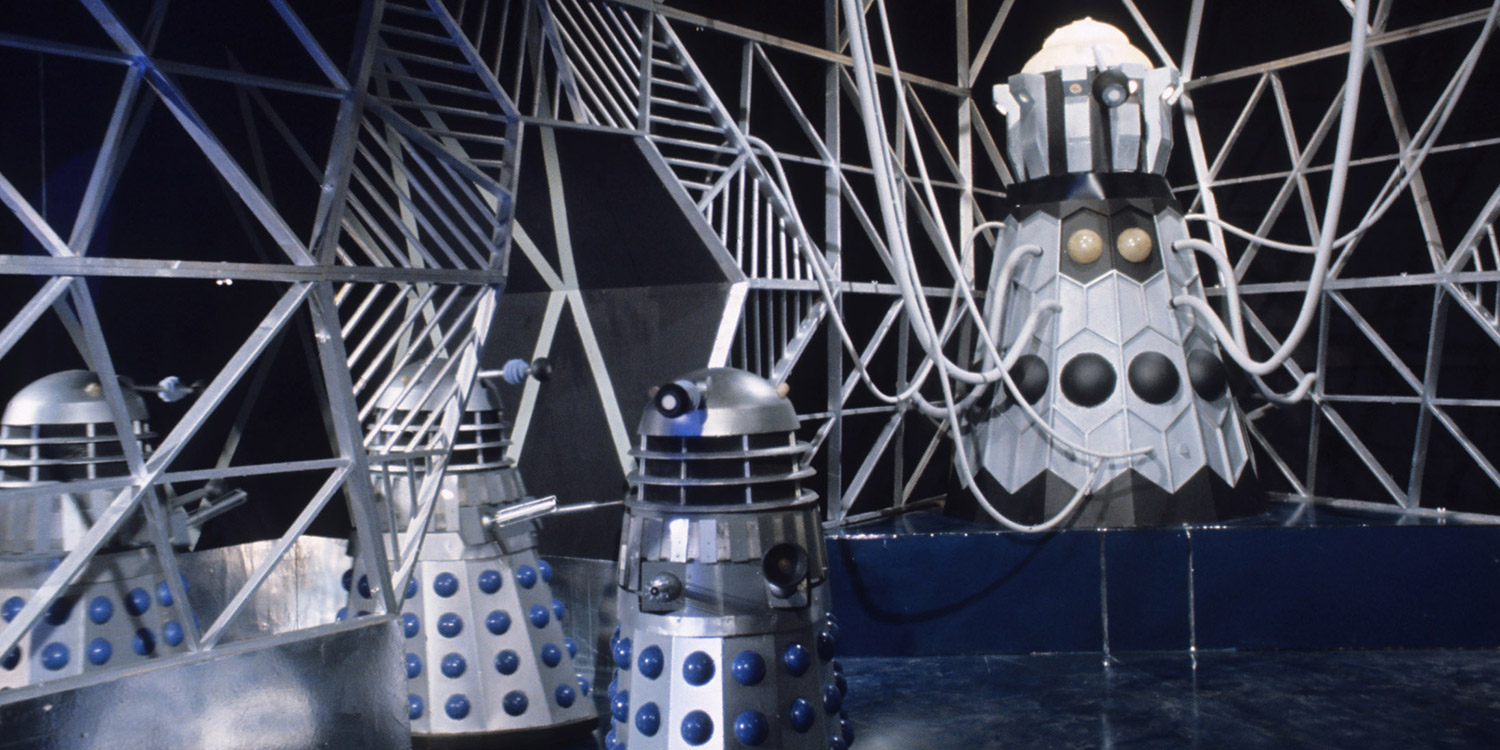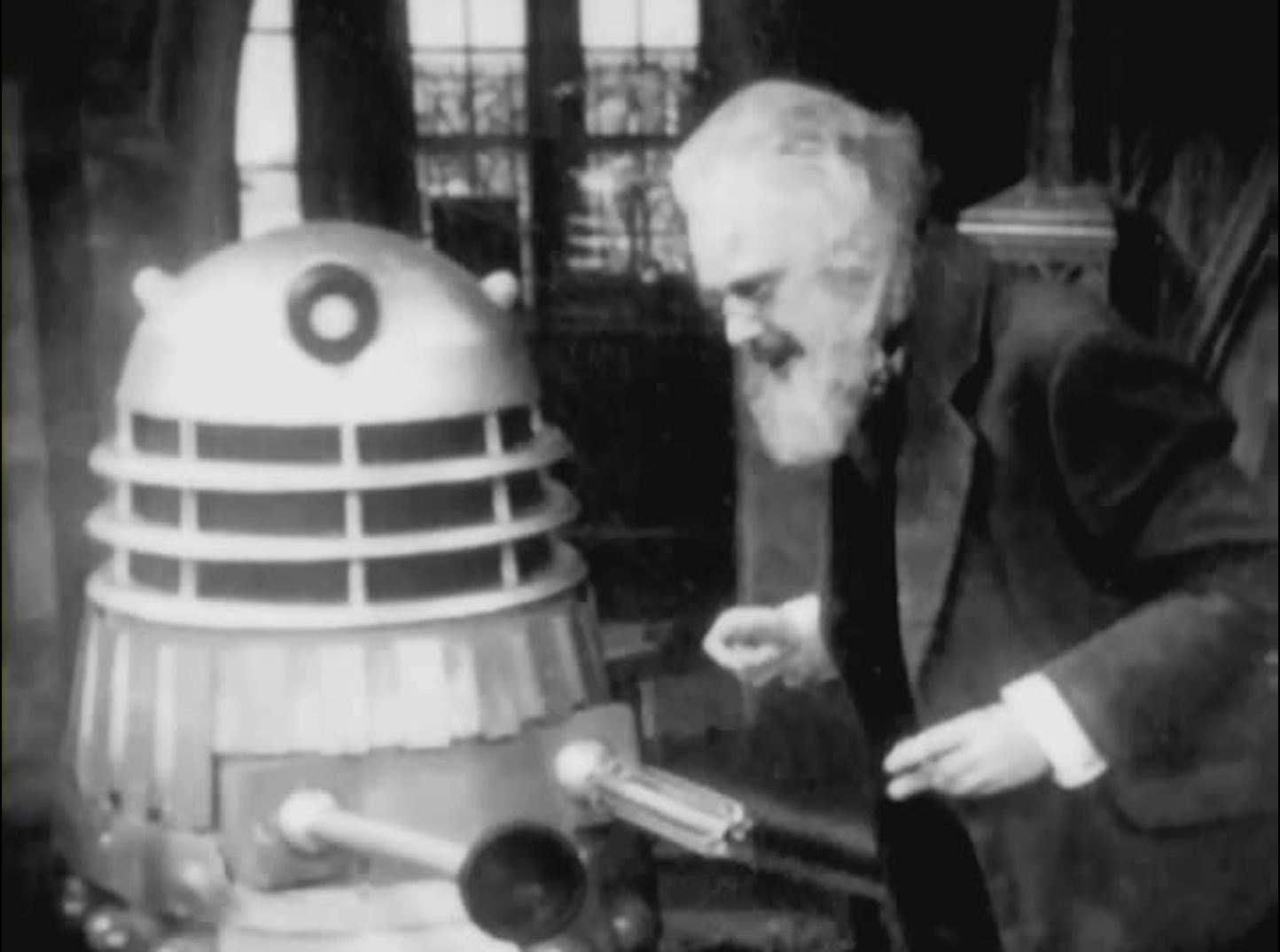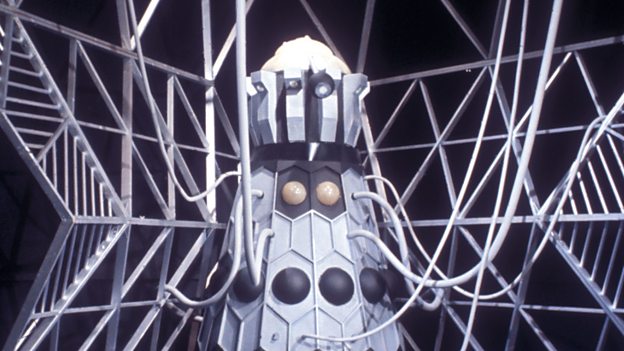‘The Evil of the Daleks’ is one of the most beloved Doctor Who stories of all time. Unfortunately, it is currently missing in its entirety from the BBC archive (with the exception of episode two) although fans will get a chance to ‘watch’ it again in 2021 when it is animated for DVD and Blu-ray. But what is it about this story that fans like so much? And does it truly deserve its place in the pantheon of Doctor Who classics?

‘The Evil of the Daleks’ stands out for a number of reasons. First, it’s one of the Second Doctor Patrick Troughton’s rare encounters with the metal mutants from Skaro (the other being his debut story, ‘The Power of the Daleks.’) So the fact that we only have one complete Dalek episode featuring the Second Doctor makes this story all-the-more special, particularly as his scene with the Daleks in episode two is so fleeting.
But it would be unfair to say that this story is so popular simply because it’s missing. In the years since its original transmission (and subsequent wiping) Doctor Who fans have been able to enjoy ‘The Evil of the Daleks’ through its surviving audio recordings and Loose Cannon reconstructions, proving to many that this seven part adventure is, indeed, a solid outing for our favourite Time Lord.
And it’s certainly an intriguing story. In ‘The Evil of the Daleks,’ the eponymous baddies are attempting to acquire the human factor – that is, the essence of what distinguishes humans from other species. The rationale behind this is that, if the Daleks can incorporate this factor into their DNA, they can become invincible. Thus, they set about acquiring human test subjects using a mirror-based time machine, which has been built by Victorian inventors Theodore Maxtible and Edward Waterfield. This rudimentary technology helps the Daleks to travel freely between planet Earth and Skaro.

Inevitably, things don’t quite go as planned. The Doctor tricks the metal mutants, and a race of purely ‘human’ Daleks is engineered instead. As a result, these creatures turn on the non-humanoid Daleks and trigger a civil war on Skaro. In the closing moments of ‘The Evil of the Daleks,’ it’s believed that the metal mutants have been destroyed forever, with the Doctor declaring the battle “a final end…”
Indeed, for a time it was thought that ‘The Evil of the Daleks’ would be the last ever Dalek story. This is because their creator Terry Nation was in the process of trying to set the Daleks up with their own TV series in the States. Consequently, he told the BBC to stop using the Daleks altogether.
Over the course of the production, though, circumstances changed – although it’s not entirely clear what happened. At the eleventh hour, the BBC’s Head of Drama Sydney Newman phoned one of directors (Timothy Combe) and ordered him to keep the Daleks alive. This would prove to be a little tricky, given that they essentially obliterate themselves in the Skaro civil war. But Combe complied, and added a glowing light to the inner shell of one of the ‘destroyed’ Daleks, hinting that some remnant had survived the onslaught.
However, viewers could be forgiven for believing that ‘The Evil of the Daleks’ was, indeed, the “final end,” given that the creatures wouldn’t return to Doctor Who for another five years. Nation’s efforts to produce a Dalek TV series ultimately failed, and the metal mutants returned to making regular appearances in the programme as of 1972. (The BBC did, however, finally give the Daleks their own animated spin-off as part of the Time Lord Victorious saga in 2020.)
In many ways, ‘The Evil of Daleks’ was more of a beginning than an ending. For one thing, it introduced the character of Victoria Waterfield, who went on to become one of the Second Doctor’s most popular companions. In addition, the famous ‘human factor’ would continue to rear its head in the Whoniverse, playing a major role in the Daleks’ big TV return in 2005’s ‘Dalek’ by Rob Shearman. Moreover, the famous Dalek Emperor would take centre stage in the climactic Series One finale ‘The Parting of the Ways,’ trying – once again – to breed a new race of Daleks out of human DNA.
And what of this Dalek Emperor? Well, his TV appearances are few, but he did make his debut in ‘The Evil of the Daleks.’ And he’s a very memorable creation, resembling an over-sized Dalek who barks orders at his lowly subordinates in thundering (almost human-sounding) tones. In addition, according to Doctor Who mythos, he evolved out of the same Dalek that fired on the demented Davros in 1975’s ‘Genesis of the Daleks,’ vowing that the Daleks would “prepare, grow stronger,” and “emerge as the supreme rulers of the universe.”

But when all things are considered, is ‘The Evil of the Daleks’ actually an enjoyable Doctor Who story? In my opinion – yes, absolutely! Admittedly, it has a bit of a slow start, linking nicely – if irksomely – to its predecessor ‘The Faceless Ones.’ And like many of the longer Doctor Who adventures, the seven episode length of ‘Evil’ does cause it to tread water occasionally.
But at the same time, ‘The Evil of the Daleks’ succeeds because it dares to be different, with the writer David Whitaker taking a fresh perspective on a returning baddie that had already featured in some seven TV stories (and a movie) by this point in the show’s history. Indeed, there’s a particularly fun (if somewhat disturbing) scene in which two child-like Daleks – infused with the human factor – force the Doctor into playing trains with them. How much easier would it have been for Whitaker to simply have the Daleks invade modern-day Earth with a couple of explosions and some casual proclamations of extermination? He’d still have have gotten ratings.
As such, it really is a shame that we can no longer enjoy ‘The Evil of the Daleks’ in all its glory, unless the missing episodes are still out there somewhere just waiting to be discovered (Philip Morris, call us.) But with the animated version arriving in September 2021, there’s no need to hang up your sink plungers just yet.
What do you think of ‘The Evil of the Daleks’? Is it over-rated, or is it truly a first class example of vintage Doctor Who? And do you think we will ever get to see this story for real? Let me know in the comments below.

Tomb of the Cybermen scarf – order now from the Lovarzi shop!

I love the Daleks, and I think it would be brilliant for the whole season to be remade!
That would be amazing!
Really looking forward to this animation as I did the others but more so on this one. Love to see the Emperor Dalek.
Yeah I’m really excited for this one too!